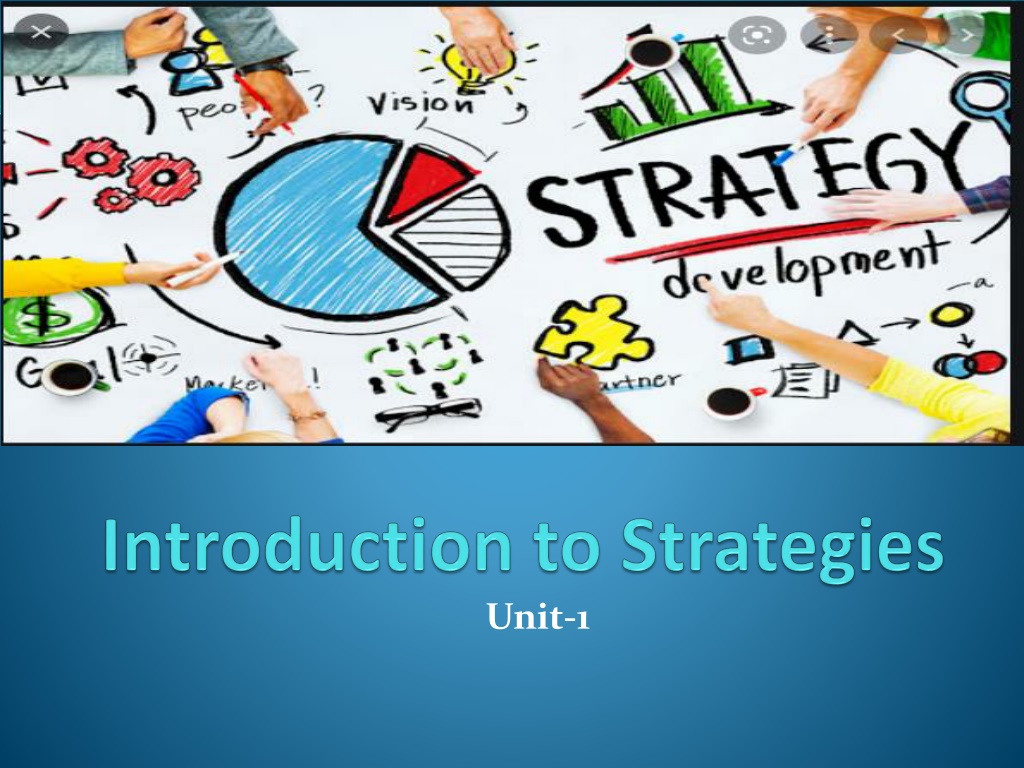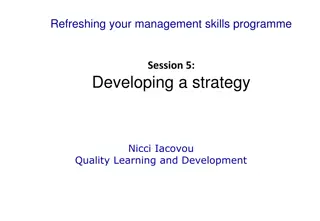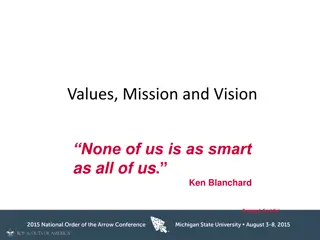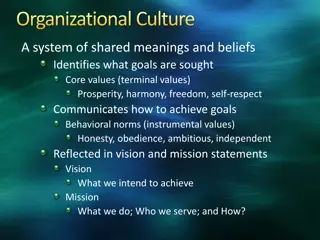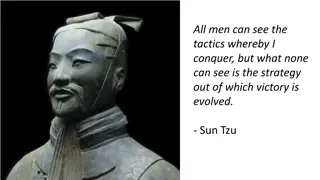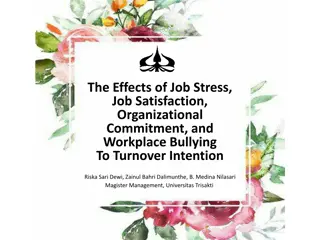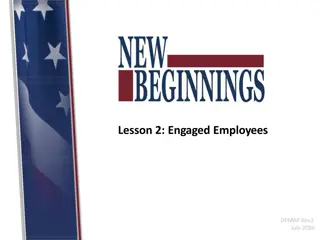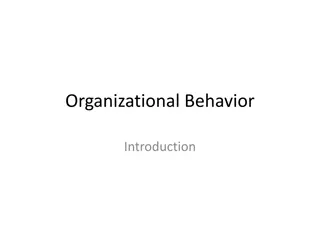Understanding the Essence of Strategy in Organizational Success
Delve into the origins and meaning of strategy, tracing it back to its Greek roots and understanding its role as a guiding roadmap for organizations. Experts like Alfred P. Chandler and Kenichi Ohmae offer insights into the definition and features of strategy, emphasizing its importance in achieving long-term goals through action-oriented, dynamic, and creative processes. Uncover how strategy shapes the competitive landscape and drives business success through resource mobilization and top management decisions.
Download Presentation

Please find below an Image/Link to download the presentation.
The content on the website is provided AS IS for your information and personal use only. It may not be sold, licensed, or shared on other websites without obtaining consent from the author. Download presentation by click this link. If you encounter any issues during the download, it is possible that the publisher has removed the file from their server.
E N D
Presentation Transcript
Introduction Origin of the word Strategy The word strategy came from the Greek word strategos , which means a General , the art of the General . In ancient Greece, the term Strategos was used in military science and implied the art and science of directing military forces to win a battle. Me
Meaning of Strategy Strategy is the road map to achieving the goals and objectives of an organization. Strategy is the plan of action adopted by the organization in order to achieve its objectives more effectively than the competitors.
Definition of Strategy In the words of Alfred P Chandler, Strategy is the determination of the basic long-term goals and objectives of an enterprise, and the adoption of courses of action and the allocation of resources necessary for carrying out these goals. According to Kenichi Ohmae, Strategy is the way in which a corporate endeavours to differentiate itself positively from its competitors, using its relative strengths to better satisfy customer needs.
Features of Strategy 1. About winning: Strategy is all about winning. It is about matching the strengths and competencies of a firm in order to win competition. 2. Long term focus Strategies are formulated and implemented for long term growth and development of business firms. Strategies help the companies achieve their long-term goals and objectives.
Features of Strategy 3. Action oriented Strategies are specific actions suggested to achieve the long-term objectives. It is the plan of action that focuses on differentiating the firm from it s competitors. 4. Futuristic Strategies are formulated for a future period and are also to be implemented in future. 5. Top management decision Strategy is a product of top management thinking. Strategies are developed by top level executives who have the knowledge and necessary information to plan for the organization as a whole.
Features of Strategy 6. Dynamic Strategies followed by business firms keep changing. Changes in the business environment bring about changes in strategies. 7. Creative process Developing strategies and improving the firm s performance require innovative ideas. Identification of new opportunities is a result of creative thinking process. 8. Resource mobilization Strategy helps in optimum utilization of available organizational resources. Resources can be allocated and used in the best interest of the company with proper strategic planning.
Features of Strategy 9. Dealing with uncertainties Strategies are concerned with future. Future is full of uncertainties and strategy helps the firm by taking into account and providing for possible risk that may arise in future. 10.Covers all levels of organization Strategies are developed at each level of organization keeping in mind the overall organizational goals and objectives.
Conceptual Evolution of Strategy Strategy, like evolution itself, started at the beginning of time. From mankind s inception, people have been devising ways to outsmart and outperform each other in a game of survival of the fittest. Survival, however, has always depended on people s ability to adapt, plan, and evolve into something stronger and better. In other words, survival depends on strategy. Much like people evolve, so do successful businesses. Strategic planning is a process of evolution where making the right moves, with the right information, at the right time is vital to achieving strategic success. Strategy truly is a process of planning.
Conceptual Evolution of Strategy Strategic processes all have a starting point. For businesses, this starting point derives from an organizational need to adapt, compete, and evolve within a competitive market. Early strategy innovators Henry Mintzberg and Max MacKeown, understood this and defined strategic planning as a pattern in a stream of decisions and about shaping the future. However, developing a pattern and shaping the future first require laying a foundation for success. Successful businesses pinpoint an overall vision, break down that vision into individual plans of action, and then change or reevaluate their plans based on key performance indicators. They understand strategic planning is a top down process where every level of an organization is part of the strategic planning process.
Scope of Strategies Strategic scope refers to the products and services a company plans to offer over a specific period, and indicates where and to which target markets they will be sold. ... Strategic scope decisions are important because they: Set targets for how much profit will come from existing vs. new markets.
Purpose of Business What is the real purpose of a business? The real purpose of a business is NOT to create profits. Because a business cannot exist outside of society and must satisfy a specific need in order to stay in business, it has to create or add additional value to the community or individuals. That s why the real purpose of a business is to create customers.
What is the purpose of business? Is it to create profits? Be your own boss? Supporting an advocacy? Provide a community a livelihood? However, when you look at organizations in the context of society, the real and only purpose of organizations should be to create customers.
purpose of business Businesses Exist Because of Its Customers Business enterprises are organs of society. They do not exist for their own sake, but to fulfill a specific social purpose and to satisfy a specific need of a society, a community, or individuals. Peter Drucker
purpose of business Peter Drucker, perhaps one of the best management thinkers of all time, said that businesses exist to fulfill a specific social purpose and to satisfy a specific need of a society. However, a lot of business owners think of organizations only from a capitalist mindset. Now, that isn t bad nor wrong by itself. It s just another way to look at it. But if that s the only thing that enters your mind to make money you are looking at businesses in the wrong way. Allow me to provide you with another perspective. Any organization won t exist without customers.
Understand Businesses as Part of Society One of the most first things you learn in economics is the concept of supply and demand. The easiest way to grasp this concept is through the circular flow of income.
Understand Businesses as Part of Society In the image above, two things happen: Individuals supply their talents and skills (labor) to businesses in exchange for compensation While businesses use this to create goods and services which are then bought/availed by individuals Of course, this is a very simplistic view of the economy. It s much more complicated than that. But it is a great way to see the relationship between businesses and their customers.
So by this we will conclude that strategy is very important but it should be focused on the purpose of the business. Thank you
